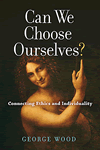Previously Published Book
Philosophy
Ethics
Are those values and beliefs, which are central to the way we live, determined by our biology? Wittgenstein thought that they were forced on us by life experiences. On the other hand, Jean-Paul Sartre saw them as a matter of choice. The book explores these issues in outlining how an ethical response develops in an individual human life.
Systematic thought about human life does not lead to universally accepted conclusions. There is, however, a measure of agreement in how individuals should respond to one another. This agreement is apparent in the deep and abiding values which make sense of our experience as social beings. Such values are the basis of an ethical response to life.
An ethical response to life connects the individual to others and others to the individual. The first of these two connections shows in an individual's capacity to empathise with others, the second in an acceptance of those standards of behaviour which come largely from culture. In the development of this second connection, responsibility, shame and reason play a significant part.
An understanding of how both connections function has implications for child rearing and education.

